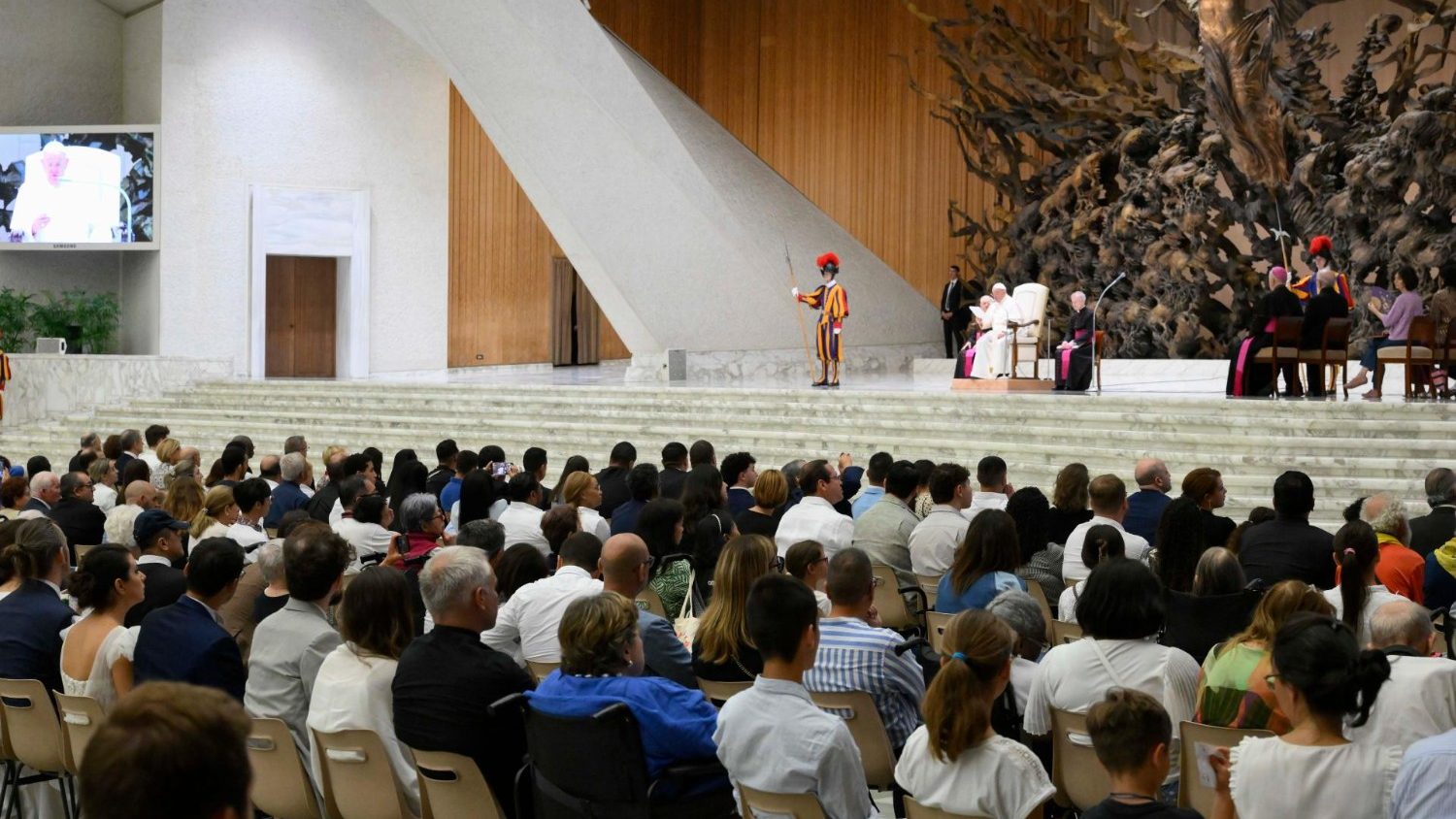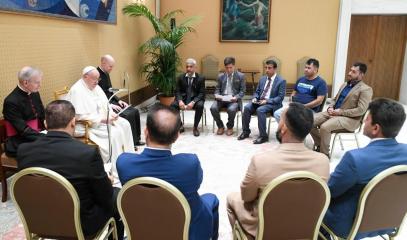Weekly audience: Pope concerned about Middle East, and Gaza’s ‘unsustainable’ situation
In his first Wednesday audience after the July break, the pontiff renewed his appeal to prevent the war from spreading and to end the “unsustainable” humanitarian situation in Gaza. He called for prayers to eliminate “discrimination against women” in Pakistan and Afghanistan. In a new cycle of catechesis, he proposed a reflection on the Holy Spirit in the Incarnation. Before the audient, the pontiff met with a delegation representing the Afghan community in Italy.
Vatican City (AsiaNews) – Pope Francis spoke to the faithful during his weekly Wednesday general audience, the first after the summer break in July.
In his address, in which he introduced a new cycle of catechesis, the pontiff said: “I continue to follow the situation in the Middle East with great concern, and I reiterate my appeal to all the parties involved that the conflict does not spread, and that there may be an immediate ceasefire on all fronts, starting with Gaza, where the humanitarian situation is very serious and unsustainable.”
Turning to today’s catechesis, he said that “we enter into the second phase of salvation history. After contemplating the Holy Spirit in the work of Creation, we will contemplate it for a few weeks in the work of Redemption, namely of Jesus Christ. So, let us move on to the New Testament”.
In his greetings in Italian at the end of the audience, after mentioning the tragic situation Gaza and other places in the Middle East at risk of war, the pope renewed his prayers, hoping that a “sincere search for peace will extinguish strife, love will overcome hatred and vengeance will be disarmed by forgiveness.”
As he has done before, the pontiff also urged the faithful to pray “for tormented Ukraine, Myanmar, Sudan: may these war-torn populations soon find the peace for which they yearn.”
In closing, before the recitation of the Our Father in Latin and the apostolic blessing, Francis denounced "discrimination against women", especially in some "regions of Pakistan and Afghanistan", calling for efforts and prayers so that it may “be eliminated".
Introducing the new cycle of catechesis, whose theme today was “the Holy Spirit in the Incarnation of the Word”, Francis explained how the Church has collected the "revealed fact" by placing it “at the heart of her Symbol of faith. In the Ecumenical Council of Constantinople, in 381 – which defined the divinity of the Holy Spirit – this article enters into the formula of the ‘Creed’, which is indeed referred to as Nicene-Constantinopolitan, and it is what we recite in every Mass. It affirms that the Son of God, ‘was incarnate of the Holy Spirit and the Virgin Mary, and was made man’.”
“It is therefore an ecumenical fact of faith,” and “Catholic piety, since time immemorial, has drawn from it one of its daily prayers, the Angelus.”
This article of faith is the foundation that allows us to speak of Mary as the Bride par excellence, who is a figure of the Church.
The pontiff cited the scriptures of Saint Leo the Great and the Dogmatic Constitution Lumen gentium of Vatican II, to say how the Church, following the example of the Virgin, “brings forth to a new and immortal life the sons who are born to her in baptism, conceived of the Holy Spirit and born of God” (nos. 63-64).
In the second part of the catechesis, the pope turned to the topics of conception and birth in the Scriptures.
“In the prophecy of Isaiah we hear: ‘Behold a young woman shall conceive and bear a son’ (7:14), and the Angel says to Mary, ‘And behold, you will conceive in your womb and bear a son’ (Lk 1:31). Mary first conceived, then bore Jesus: first she welcomed Him into herself, in her heart and her flesh, then she gave birth to Him.”
This is what also “happens for the Church: first she welcomes the Word of God, letting it ‘speak tenderly to her’ (cf. Hos 2:14), and ‘fill [her] stomach’ (cf. Ez 3:3), in accordance with two biblical expressions, and then she gives birth to it with her life and preaching.”
For the Church, as for Mary, when one is faced with "tasks beyond her strength,” the question arises spontaneously: “How is this possible?”
Indeed, “How is it possible to proclaim Jesus Christ and His salvation to a world that seems to seek only well-being? The answer is also the same as then: ‘You shall receive power when the Holy Spirit has come upon you’ (Acts 1:8), as the risen Jesus says to the Apostles, with almost the same words addressed to Mary in the Annunciation.”
Both the Church and Catholics, we “sometimes find ourselves, in life, in situations beyond our strength and ask ourselves: ‘How can I cope with this situation?’” It helps, in such cases, to repeat to ourselves what the angel said to the Virgin: ‘With God nothing will be impossible’ (Lk 1:37).”
Finally, “let us too, every time, resume our journey with this comforting certainty in our hearts: ‘With God nothing will be impossible’.”
In the morning, Pope Francis met with a delegation from the Afghan Community Association in Italy, a country he mentioned in the audience, with a “complicated and tragic story [...] of wars and bloody conflicts.”
Addressing the delegation, he underlined the theme of exile that comes with “instability, war operations with their burden of destruction and death, internal divisions and impediments to being recognized some fundamental rights".
In his reflection, he delved into the problems in the border area with Pakistan "where the intertwining of ethnic groups and the extreme ‘porosity’ of the borders determine a situation that is not easy", above all for minorities and the Pashtun ethnic group across the border in Pakistan.
"It is therefore indispensable," he said, citing the document on Fraternity with the Grand Imam of Al-Azhar, "that everyone matures in the conviction that one cannot, in the name of God, foment contempt for the other, hatred and violence.”
Thus, "I encourage you, therefore, to continue in your noble intention to promote religious harmony and to work to overcome misunderstandings between the different religions in order to build a path of trusting dialogue and peace."
(Photos from Vatican media)








.png)










